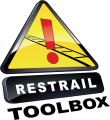2.1 Learning from international experience
This measure concerns monitoring the interventions of others and learning from foreign experience in order to improve or innovate one’s own practice.
- Keep updated with the evaluation process of interventions for identification of targets for safety measures and effective measures.
- Make sure your staff includes suitably trained persons for research, audit and analysis.
- Compare the gap between existing performance and “best” practice reported by others.
- Evaluate the measures you are implementing and share your results. Need to be sure that the data being compared is based on the same definitions
- Be aware that monitoring and learning from best international practice is not really a measure that would reduce railway suicides and trespassing accidents as such. It can only promote the implementation of effective measures.
- There is need for shared databases in order to share of best practice (especially at international level).
- There is need for good collaboration between organisations as there may be different organisational philosophies which could be problematic (e.g. some may accept the need for continual learning whilst others may not, best practice interventions may not be necessary in some countries, depending upon the nature of the problems of suicide and trespass).
- Learning may need to be coupled with other interventions to support dissemination and process changes as a result of any findings. There may need to be a coordinating role for cross-industry improvements, with support from all relevant organisations within the industry.
- Recommendation to create an international train suicide database with standardized definitions, similar to the International Road Traffic and Accident Database (IRTAD ) (van Houwelingen, 2011).
- International experience such as the RESTRAIL project contributed to the development better interventions through understanding of behaviours of people (Ryan, 2013).
- International experience such as the RESTRAIL contributed to the development of new methodologies for assessment of the most promising preventative measures (Ryan & Kallberg, 2013).
last update: 2014-09-09 Print

